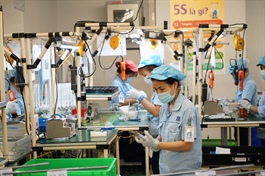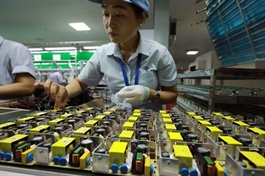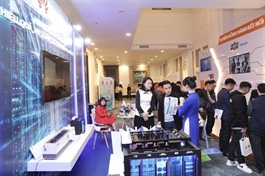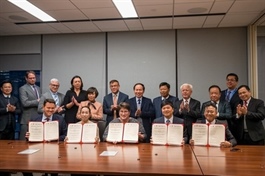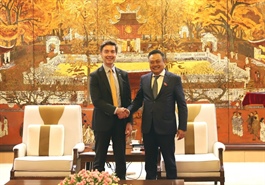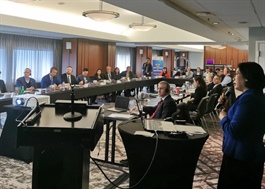Hanoi forecasts GRDP growth of 6.11% in 2023
Hanoi forecasts GRDP growth of 6.11% in 2023
The city expects a strong economic rebound in 2024, with an estimated GRDP growth of 6.5-7%.
Hanoi is expected to achieve an economic growth of 6.11% in 2023, a positive performance considering the challenges faced by both global and domestic economies.
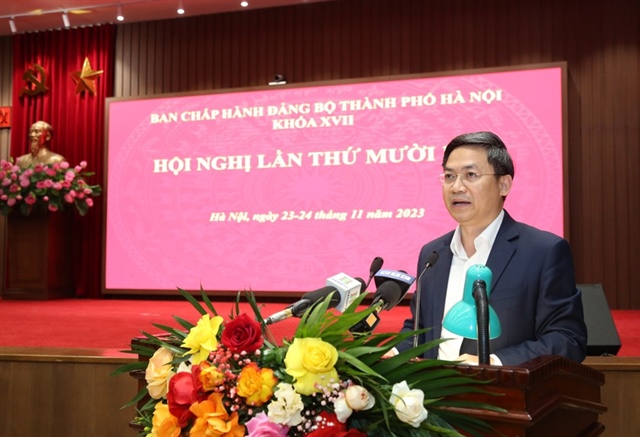
Vice Chairman of the Hanoi People's Committee Ha Minh Hai. Photos: Thanh Hai/The Hanoi Times |
Vice Chairman of the Hanoi People’s Committee Hai Minh Hai revealed the figures at a city meeting on November 23.
Hai added that in 2023, the city’s socio-economic performance is expected to meet the overarching objectives successfully, achieving 18 out of the 23 planned targets, with three surpassing expectations. Other key economic indicators include a 9% increase in social investment and nearly US$2.9 billion in Foreign Direct Investment (FDI), marking a 62% year-on-year rise.
Total retail sales of goods and consumer services are projected to rise by over 10%, and domestic and international tourist figures are expected to exceed the set targets. The year also witnessed the establishment of almost 26,500 new businesses, reflecting a 6% increase against 2022.
In addition, Hanoi’s state budget revenues are on track to exceed projections. The expected total revenue is over VND400 trillion ($16.5 billion), reaching 113.5% of the estimate, a 20% increase compared to 2022.
The expected total expenditure is over VND102 trillion ($4.2 billion), reaching 97.2% of the original estimate. Export turnover is estimated at $17.3 billion, a 1.0% increase, while import turnover is projected at $44.2 billion, up by 8.0%.
Hai noted that accelerated progress has been made in urban planning and management, with the approval of several significant plans. Noteworthy projects include the draft capital planning and the adjustment to Hanoi’s overall construction planning, currently seeking feedback for completion.
Substantial investments are being made in infrastructure construction and urban development, with completed projects such as the extension of Huynh Thuc Khang Street, Vinh Tuy Bridge phase 2, and Chua Boc - Pham Ngoc Thach intersection flyover, as well as the start of construction of Ring Road No.4.
Hai added that Hanoi is actively engaged in the development of commercial, social, and resettlement housing and is expediting projects for the renovation and reconstruction of old apartment buildings. Regulations pertaining to the renovation and reconstruction of apartment buildings are being finalized, and there is a focus on advancing clean water supply projects.
In the socio-cultural domains, development is evident with investment plans in education, healthcare, and monument renovation set to complete 1,005 projects by the end of 2023. Cultural activities, sports, and festivals are experiencing a robust recovery, he added.
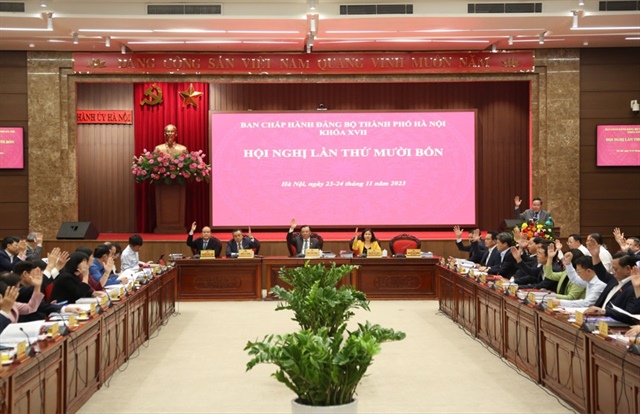
Overview of the meeting. |
Strong economic rebound targeted for 2024
In 2024, Hanoi has outlined key objectives for socio-economic development, aiming to achieve overall growth while keeping inflation under control and ensuring essential economic stability in the capital.
“The city is committed to advancing administrative reforms through digital transformation, enhancing the efficiency of its apparatus, and fostering a conducive environment for investment and business,” said Hai.
Additionally, there is a focus on comprehensive development in the cultural, educational, and health sectors, alongside the integration of digital infrastructure and technology to build smart cities.
According to Hai, Hanoi has set 24 indicators or indicator groups for the year, with specific targets, such as increasing gross regional domestic product (GRDP) by 6.5-7%, maintaining the Consumer Price Index (CPI) below 4%, achieving GRDP per capita of approximately VND160-162 million ($6,593-6,676), and increasing realized investment capital by 10.5-11.5%. Other targets include reducing the number of poor households by 300-400.
To accomplish these goals, the city has identified nine key tasks and solutions for 2024. These include ensuring growth goals while managing inflation and economic balances, restructuring industries with a focus on technology integration, organizing administrative units at the district and commune levels, enhancing the efficiency of local government, and improving the investment and business environment. The plan also emphasizes addressing challenges and promoting production and business activities.
Furthermore, Hai stressed the city’s commitment to the comprehensive and synchronous development of culture, education, and health, with a specific focus on the capital's cultural industry, digital infrastructure, technology application, and the creation of smart cities.
Social security and welfare policies are highlighted, aiming to elevate the material and spiritual well-being of the people. The plan also underscores the need to enhance the effectiveness of land and resource management, environmental protection, and proactive responses to climate change.
Other priorities include completing Hanoi Planning for the 2021-2030 period with a vision to 2050, adjusting the Hanoi General Planning to 2045 with a vision to 2065, and completing the revised Capital Law once approved.
Moreover, the city is committed to improving the effectiveness of foreign affairs and international integration, ensuring national defense, and local military strength, and maintaining social order and safety.
A continued emphasis on the prevention and combatting of corruption, negativity, and waste is also in focus, Hai stressed.



